Following is the list of cities and the associated costs for CABG in Thailand:
| City | Minimum Cost (USD) | Minimum Cost (THB) | Maximum Cost (USD) | Maximum Cost (THB) |
|---|---|---|---|---|
| Nonthaburi | USD 10800 | 385020 | USD 22500 | 802125 |
| Bangkok | USD 12000 | 427800 | USD 25000 | 891250 |
| Krabi | USD 12000 | 427800 | USD 25000 | 891250 |
Following is the list of countries and the associated costs for CABG:
Treatment cost

MediGence is offering immense facilities for your medical journey such as:
We provide packages at economical prices with a number of additional benefits which make it a better opportunity than spending actual hospital costs with singular benefits. Coronary artery bypass grafting (CABG) betters blood flow to the heart. It is a treatment option for a patient who has been suffering from Coronary Heart Disease. Coronary Heart Disease or Coronary Artery Disease in which plaque can add on within the coronary arteries reducing the oxygen-rich blood supply to the heart. In CABG a healthy vein or artery anywhere else from the body is connected to or grafted to the coronary artery which is blocked which bypasses the blocked part., We have outstanding options with all kinds of benefits for you to get the CABG surgery done in Sarvodaya Hospital and Research Centre, India.
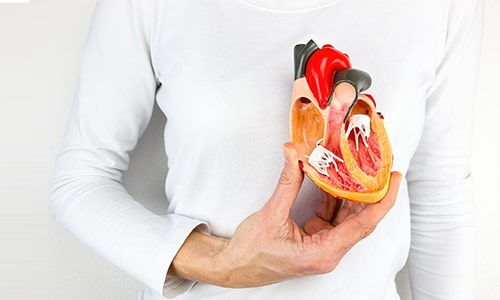
We provide numerous services for your medical journey, including:
With us, you are sure to receive all the benefits at competitive prices which is a better choice than paying actual hospital costs. Coronary artery bypass grafting (CABG) betters blood flow to heart. It is a treatment option for a patient who has been suffering from Coronary Heart Disease. Coronary Heart Disease or Coronary Artery Disease in which plaque can add on within the coronary arteries reducing the oxygen rich blood supply to heart. In CABG a healthy vein or artery anywhere else from the body is connected to or grafted to the coronary artery which is blocked which bypasses the blocked part., We have outstanding options with all kinds of benefits for you to get the CABG surgery done in Fortis Hospital, Shalimar Bagh, India.
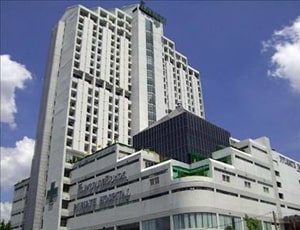
Types of Coronary Artery Bypass Grafting (CABG) in Piyavate Hospital and its associated cost
| Treatment Option | Approximate Cost Range (USD) | Approximate Cost Range (THB) |
|---|---|---|
| CABG (Overall) | 26320 - 51265 | 930339 - 1839099 |
| On-Pump CABG | 26339 - 35260 | 950368 - 1276221 |
| Off-Pump CABG | 28924 - 39391 | 1061472 - 1401296 |
| Minimally Invasive CABG | 33959 - 45936 | 1222798 - 1605347 |
| Robot-Assisted CABG | 39582 - 50277 | 1434736 - 1810311 |
| Redo CABG | 31707 - 43631 | 1130153 - 1549591 |
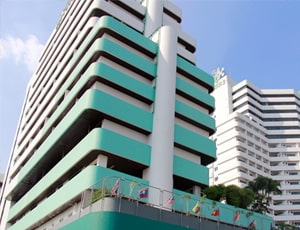
Types of Coronary Artery Bypass Grafting (CABG) in Phyathai 2 International Hospital and its associated cost
| Treatment Option | Approximate Cost Range (USD) | Approximate Cost Range (THB) |
|---|---|---|
| CABG (Overall) | 26553 - 49826 | 923667 - 1789183 |
| On-Pump CABG | 25797 - 36746 | 948525 - 1296627 |
| Off-Pump CABG | 29279 - 39642 | 1023557 - 1378943 |
| Minimally Invasive CABG | 34449 - 44672 | 1210221 - 1633179 |
| Robot-Assisted CABG | 39778 - 50806 | 1405065 - 1816774 |
| Redo CABG | 31707 - 41818 | 1102168 - 1517895 |
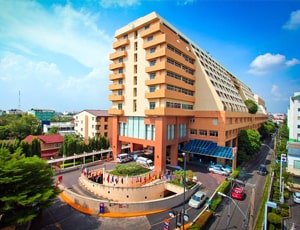
Types of Coronary Artery Bypass Grafting (CABG) in Vejthani Hospital and its associated cost
| Treatment Option | Approximate Cost Range (USD) | Approximate Cost Range (THB) |
|---|---|---|
| CABG (Overall) | 25926 - 50131 | 925328 - 1833415 |
| On-Pump CABG | 26740 - 36524 | 943834 - 1271560 |
| Off-Pump CABG | 29627 - 38739 | 1034170 - 1380488 |
| Minimally Invasive CABG | 33511 - 45503 | 1193645 - 1579550 |
| Robot-Assisted CABG | 39609 - 51142 | 1429922 - 1796324 |
| Redo CABG | 31891 - 42557 | 1107658 - 1555365 |

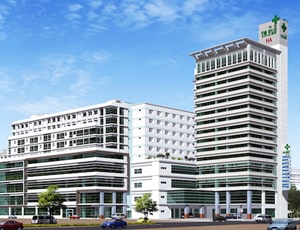
Types of Coronary Artery Bypass Grafting (CABG) in Yanhee International Hospital and its associated cost
| Treatment Option | Approximate Cost Range (USD) | Approximate Cost Range (THB) |
|---|---|---|
| CABG (Overall) | 26636 - 50610 | 920208 - 1804698 |
| On-Pump CABG | 26234 - 35396 | 931716 - 1301507 |
| Off-Pump CABG | 29375 - 40001 | 1036509 - 1391208 |
| Minimally Invasive CABG | 33785 - 44498 | 1194822 - 1629867 |
| Robot-Assisted CABG | 38895 - 51730 | 1413927 - 1833970 |
| Redo CABG | 31050 - 42236 | 1113441 - 1540623 |
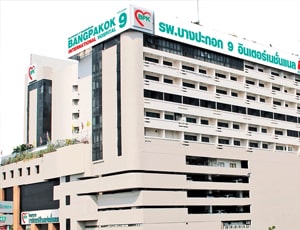
Types of Coronary Artery Bypass Grafting (CABG) in Bangpakok 9 International Hospital and its associated cost
| Treatment Option | Approximate Cost Range (USD) | Approximate Cost Range (THB) |
|---|---|---|
| CABG (Overall) | 26119 - 50247 | 950987 - 1826068 |
| On-Pump CABG | 25905 - 35931 | 920130 - 1296553 |
| Off-Pump CABG | 29369 - 38778 | 1053378 - 1432900 |
| Minimally Invasive CABG | 33140 - 45475 | 1182572 - 1571915 |
| Robot-Assisted CABG | 39317 - 51615 | 1416685 - 1843015 |
| Redo CABG | 30970 - 43286 | 1130851 - 1499931 |
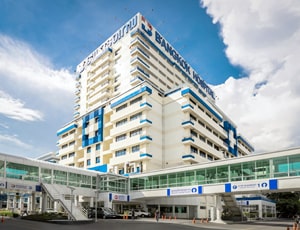
Types of Coronary Artery Bypass Grafting (CABG) in Bangkok Hospital and its associated cost
| Treatment Option | Approximate Cost Range (USD) | Approximate Cost Range (THB) |
|---|---|---|
| CABG (Overall) | 26649 - 49753 | 955432 - 1825127 |
| On-Pump CABG | 26697 - 35220 | 925800 - 1295464 |
| Off-Pump CABG | 28777 - 39253 | 1034561 - 1406570 |
| Minimally Invasive CABG | 33123 - 45948 | 1176510 - 1621642 |
| Robot-Assisted CABG | 39988 - 51257 | 1418887 - 1797448 |
| Redo CABG | 30891 - 42420 | 1123511 - 1546944 |
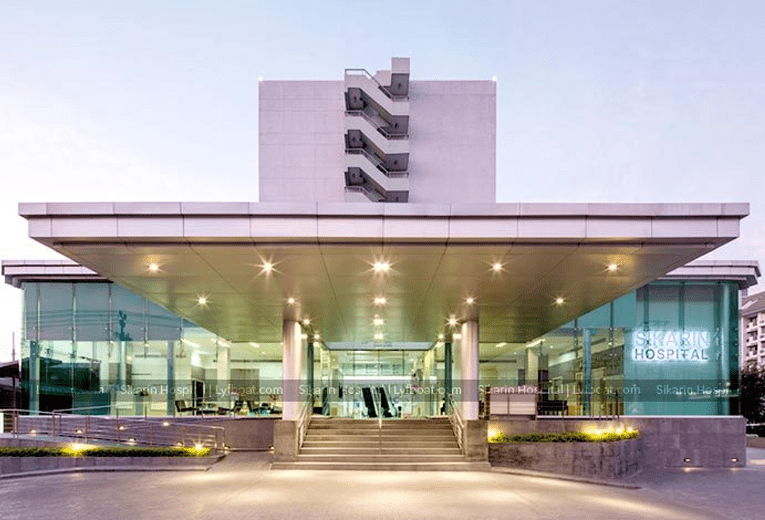
Types of Coronary Artery Bypass Grafting (CABG) in Sikarin Hospital and its associated cost
| Treatment Option | Approximate Cost Range (USD) | Approximate Cost Range (THB) |
|---|---|---|
| CABG (Overall) | 26668 - 49534 | 919706 - 1784772 |
| On-Pump CABG | 26300 - 35832 | 948872 - 1288109 |
| Off-Pump CABG | 28740 - 39707 | 1030407 - 1404092 |
| Minimally Invasive CABG | 33799 - 44755 | 1205012 - 1599550 |
| Robot-Assisted CABG | 39051 - 49732 | 1375147 - 1789929 |
| Redo CABG | 30988 - 43141 | 1098171 - 1527625 |
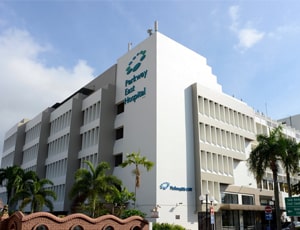
Parkway East Hospital located in Joo Chiat Pl, Singapore is accredited by JCI. Also listed below are some of the most prominent infrastructural details:
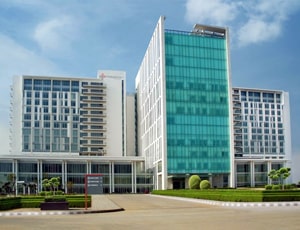
Types of Coronary Artery Bypass Grafting (CABG) in Medanta - The Medicity and its associated cost
| Treatment Option | Approximate Cost Range (USD) | Approximate Cost Range (INR) |
|---|---|---|
| CABG (Overall) | 4639 - 17356 | 380555 - 1442901 |
| On-Pump CABG | 4772 - 8478 | 386918 - 696773 |
| Off-Pump CABG | 5614 - 9564 | 464477 - 796524 |
| Minimally Invasive CABG | 8375 - 13605 | 706670 - 1093653 |
| Robot-Assisted CABG | 11119 - 17119 | 935709 - 1372632 |
| Redo CABG | 8510 - 13618 | 706777 - 1108570 |
DOCTORS IN 14 SPECIALITIES
FACILITIES & AMENITIES
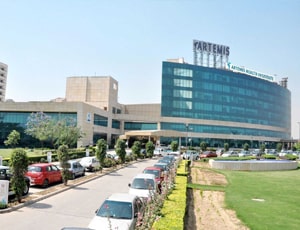
Types of Coronary Artery Bypass Grafting (CABG) in Artemis Health Institute and its associated cost
| Treatment Option | Approximate Cost Range (USD) | Approximate Cost Range (INR) |
|---|---|---|
| CABG (Overall) | 4790 - 17252 | 381574 - 1449205 |
| On-Pump CABG | 4756 - 8253 | 389368 - 684366 |
| Off-Pump CABG | 5570 - 9450 | 463186 - 792205 |
| Minimally Invasive CABG | 8357 - 13414 | 688416 - 1116326 |
| Robot-Assisted CABG | 11044 - 16955 | 919848 - 1378518 |
| Redo CABG | 8512 - 13552 | 680363 - 1103649 |
DOCTORS IN 15 SPECIALITIES
FACILITIES & AMENITIES
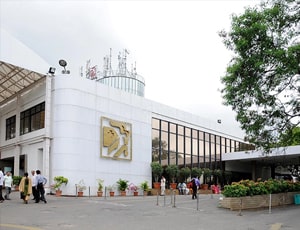
Types of Coronary Artery Bypass Grafting (CABG) in Apollo Hospitals and its associated cost
| Treatment Option | Approximate Cost Range (USD) | Approximate Cost Range (INR) |
|---|---|---|
| CABG (Overall) | 4818 - 17314 | 379211 - 1454836 |
| On-Pump CABG | 4835 - 8339 | 398744 - 695371 |
| Off-Pump CABG | 5733 - 9491 | 468789 - 774678 |
| Minimally Invasive CABG | 8319 - 13499 | 700756 - 1124393 |
| Robot-Assisted CABG | 11194 - 16807 | 904967 - 1354681 |
| Redo CABG | 8570 - 13302 | 701308 - 1111267 |
DOCTORS IN 14 SPECIALITIES
FACILITIES & AMENITIES
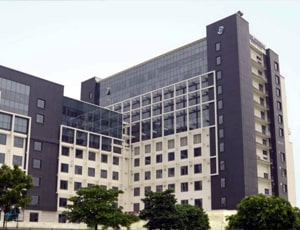
Types of Coronary Artery Bypass Grafting (CABG) in Venkateshwar Hospital and its associated cost
| Treatment Option | Approximate Cost Range (USD) | Approximate Cost Range (INR) |
|---|---|---|
| CABG (Overall) | 4271 - 15764 | 348541 - 1295271 |
| On-Pump CABG | 4324 - 7634 | 355034 - 623088 |
| Off-Pump CABG | 5062 - 8616 | 416591 - 704253 |
| Minimally Invasive CABG | 7646 - 12163 | 622641 - 995403 |
| Robot-Assisted CABG | 10141 - 15275 | 835523 - 1243073 |
| Redo CABG | 7648 - 12230 | 626336 - 1001298 |
DOCTORS IN 13 SPECIALITIES
FACILITIES & AMENITIES
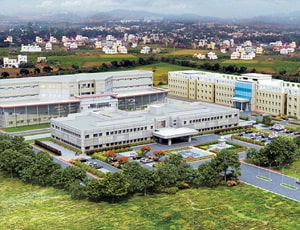
Types of Coronary Artery Bypass Grafting (CABG) in Global Health City and its associated cost
| Treatment Option | Approximate Cost Range (USD) | Approximate Cost Range (INR) |
|---|---|---|
| CABG (Overall) | 4706 - 17381 | 387205 - 1400732 |
| On-Pump CABG | 4703 - 8431 | 384313 - 693686 |
| Off-Pump CABG | 5729 - 9398 | 466759 - 784066 |
| Minimally Invasive CABG | 8424 - 13539 | 702097 - 1094977 |
| Robot-Assisted CABG | 11383 - 16782 | 903237 - 1407218 |
| Redo CABG | 8254 - 13542 | 699216 - 1096455 |
DOCTORS IN 14 SPECIALITIES
FACILITIES & AMENITIES
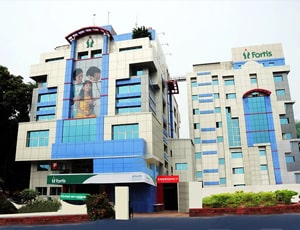
Types of Coronary Artery Bypass Grafting (CABG) in Fortis Malar Hospital and its associated cost
| Treatment Option | Approximate Cost Range (USD) | Approximate Cost Range (INR) |
|---|---|---|
| CABG (Overall) | 4247 - 15782 | 350101 - 1295476 |
| On-Pump CABG | 4323 - 7580 | 352323 - 625477 |
| Off-Pump CABG | 5068 - 8600 | 416059 - 706542 |
| Minimally Invasive CABG | 7624 - 12196 | 627122 - 1003375 |
| Robot-Assisted CABG | 10196 - 15292 | 835910 - 1249488 |
| Redo CABG | 7601 - 12127 | 623324 - 998601 |
DOCTORS IN 9 SPECIALITIES
FACILITIES & AMENITIES
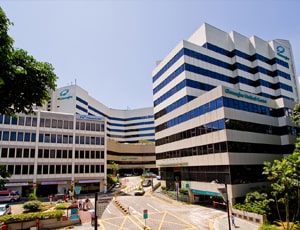
Gleneagles Hospital located in Napier Road, Singapore is accredited by JCI. Also listed below are some of the most prominent infrastructural details:
Coronary artery bypass grafting (CABG) is a type of an open heart surgery that intends to improve the flow of blood to the heart. It involves the placement of a coronary artery bypass graft, which is retrieved from a healthy artery in the body, and placed in the position of the blocked portion of the artery that supplies blood to the heart. CABG surgery is a complex, yet common procedure.
A waxy substance called plaque may deposit in good amount in the coronary arteries of the heart over a period of time. As time advances, the plaque starts hardening and eventually ruptures and breaks open. The plaque interferes with blood flow as arteries grow narrow at the affected region. A blood clot develops when the plaque ruptures. The artery may get blocked completely is the size of the clot is big enough to stop the flow of blood to the heart. This may eventually lead to serious events such as heart attack and also put the individual at the risk of death.
The person may experience chest pain and discomfort when the heart is deprived of rich oxygenated blood This pain is referred to as angina. Breathlessness and fatigue are some of the other problems associated with coronary heart disease.
Coronary artery bypass surgery aims at improving the overall blood circulation to the heart. A part of healthy artery or vein from another part of the body is taken and is grafted or connected to the blocked coronary artery for bypass. This artery or vein goes around the blocked portion of the coronary artery and establishes a new path for the blood to flow to the heart, thus reducing the chance of a heart attack. In a single surgery, surgeons can bypass multiple coronary arteries. Severe blockages can be treated with this procedure.
CABG is conducted when there are one or two blockages in the artery. High risk CABG is conducted when there are multiple blockages in the artery and the blood flow to the heart is severely restricted.
There are two approaches to conduct CABG – open heart surgery and laparoscopic bypass heart surgery. The latter is a type of minimally invasive heart bypass surgery, which involves the creation of smaller incisions. This results in minimum discomfort and complications and allows for faster recovery and healing.
Laparoscopic bypass heart surgery is mostly preferred when there is not much blockage in the coronary artery. Open heart surgery, on the other hand, is conducted in complicated cases. High-risk CABG is mostly conducted as an open heart surgical procedure.
Patients are transferred to the ICU right after the surgery and shifted to the patient ward a day later. Heart rhythm disturbances are discovered in 25 percent of the patients within a period of 3 or 4 days after the surgery. They are temporary atrial fibrillations associated with surgical trauma. Such patients respond well to standard medical therapies.
They can be weaned within a period of a month after the surgery. From one week to one day, the range of stay in the hospital may vary from one patient to the other. Young patients are usually discharged within two days. The recovery time can be very long and the range of physical activities must be kept to a minimum.
Ask your healthcare adviser for the best multiple options and choose the one that meets your expectations
The minimum cost of Heart Bypass Surgery (CABG) in Thailand is about USD 23400. In Thailand, Coronary Artery Bypass Grafting (CABG) is conducted across many multispecialty hospitals.
Different hospitals have different pricing policy when it comes to the cost of Coronary Artery Bypass Grafting (CABG) in Thailand. The Coronary Artery Bypass Grafting (CABG) package cost usually includes all the expenses related to pre and post surgery expenses of the patient. The Coronary Artery Bypass Grafting (CABG) package in Thailand includes the fees of the surgeon, hospitalization and anesthesia as well. Post-surgical complications, new findings and delayed recovery may have an impact on the total Coronary Artery Bypass Grafting (CABG) cost in Thailand.
There are several best hospitals for Heart Bypass Surgery in Thailand. Some of the best hospitals for Coronary Artery Bypass Grafting (CABG) in Thailand include the following:
After Coronary Artery Bypass Grafting (CABG) in Thailand, the patient is supposed to stay in guest house for another 21 days. This duration of stay is recommended to complete all the necessary follow-ups and control tests to ensure that the surgery was successful.
Thailand is one of the most popular countries for Coronary Artery Bypass Grafting (CABG) in the world. The country offers the best treatment of Coronary Artery Bypass Grafting (CABG), best doctors, and advanced hospital infrastructure. Some of the other top destinations for Coronary Artery Bypass Grafting (CABG) include the following:
Apart from the cost of Coronary Artery Bypass Grafting (CABG), the patient is also required to pay additionally for daily meals and guest house accommodation. These charges may vary starting from USD$ 25 per person.
There are many cities that offer CABG procedure in Thailand, including the following:
The average duration of stay at the hospital after Coronary Artery Bypass Grafting (CABG) is about 5 days for proper care and monitoring. The patient is subjected to several biochemistry and radiological scans to see that everything is okay and the recovery is on track. After making sure that patient is clinically stable, discharge is planned.
There are about 7 Coronary Artery Bypass Grafting (CABG) hospitals in Thailand that are best known for their services. These hospitals are approved to perform the surgery and have proper infrastructure to handle Coronary Artery Bypass Grafting (CABG) patients.
Heart bypass surgery is also known as coronary artery bypass graft (CABG) surgery. It is a surgery conducted in patients who suffer from coronary artery disease (CAD) characterized by blockage in the arteries that reduces the flow of blood to the cardiac muscles. The main intent of the surgery is to relieve angina (chest pain) and prevent fatal cardiac events.
Heart bypass surgery in Thailand is conducted in many hospitals. Thailand is a popular medical tourism destination that is hugely popular for cardiac, neurosurgery, orthopedic, cosmetic and infertility treatment.
Some of the reasons why patients should travel to Thailand for bypass surgery include the following:
Availability of state-of-the-art Cath labs
Experienced and qualified surgeons
Advanced facilities
Great infrastructure
The environment should be conducive to recovery
All facilities under one roof
No waiting time for treatment
Heart bypass surgery cost in Thailand starts at around $8500 in Thailand. As compared to the Western countries, the bypass surgery cost in Thailand is still competitive and reasonable. The total heart bypass surgery cost in Thailand is at least 50 percent, if not more, cheaper than the cost of surgery in the UK and the US. The total cost of bypass surgery in Thailand, however, depends on several factors. Some of these factors include the following:
Bangkok, being the capital of Thailand, is also the medical tourism hub in the country. The Bangkok city has many internationally accredited hospitals that offer cardiac treatment to patients from across the world. A majority of the best hospitals in Bangkok for cardiac bypass are accredited by the Joint Commission International (JCI). Other than Bangkok, Krabi, Phuket, Chiang Mai, and Pattaya are also popular for medical treatment. Thailand is a beautiful country and receives millions of tourists from across the world every year. Many patients prefer to choose to go to popular cities in Thailand to get quality medical treatment and stay there for a while after discharge to recuperate and recovery in a serene and peaceful environment.
There are many good hospitals in Thailand where you can get the bypass surgery done. The JCI-certified hospitals in Bangkok are equipped with state-of-the-art facilities and are known to provide the best quality of medical care and other services. Some of the best hospitals in Thailand to get CABG done include the following:
Thailand is globally renowned for its quality of medical treatment. With that said, cardiac treatment in Thailand has great success rates. The cardiac bypass is Thailand has more than 90 percent success rates. However, the actual success rates depend on a number of factors, including the following: